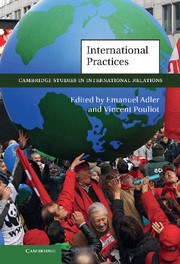Book contents
- Frontmatter
- Contents
- Figure
- Note on the contributors
- Acronyms and abbreviations
- Part I Practices in International Relations and social theory
- Part II Practices and their background
- Part III The evolution of practices
- 6 The practice of deterrence
- 7 Britain’s response to the Spanish Civil War
- 8 Domestic practices and balancing
- Part IV Practices in practice
- Part V Conclusion
- Index
- References
7 - Britain’s response to the Spanish Civil War
investigating the implications of foregrounding practice for English School thinking
from Part III - The evolution of practices
Published online by Cambridge University Press: 05 June 2012
- Frontmatter
- Contents
- Figure
- Note on the contributors
- Acronyms and abbreviations
- Part I Practices in International Relations and social theory
- Part II Practices and their background
- Part III The evolution of practices
- 6 The practice of deterrence
- 7 Britain’s response to the Spanish Civil War
- 8 Domestic practices and balancing
- Part IV Practices in practice
- Part V Conclusion
- Index
- References
Summary
At first sight, it might seem that taking practices seriously has little that is new to offer members of the English School because they have habitually acknowledged the centrality of practice in International Relations (IR) and attacked any attempt to establish a categorical distinction between theory and practice. Instead, they have worked on the hermeneutic assumption that to develop a theoretical understanding of IR it is necessary to start from the premise that we need to explore “the thought already embodied and at work in practice.” Not only has the English School always acknowledged the centrality of institutional practices in the constitution of international society, but there is now also a growing interest in how the specific practices that constitute the international society have formed and evolved over time. At the same time, however, there is now an emerging recognition that the foregrounding of practices in IR is drawing attention to an expanding body of theoretical literature on the nature of practice that reveals how much the English School has tended to take the idea of practice for granted. By drawing more explicitly on this literature, the English School can clarify the distinctive nature of its approach as well as rendering its theoretical underpinnings more robust. Although English School thinking can be viewed as part of the turn to practice that is now taking place in IR, as Adler and Pouliot argue in Chapter 1 in this volume, it is possible and indeed perhaps even essential to view this notion from a much wider and more ambitious perspective. The aim of this volume is to show that taking international practices seriously can be used to provide an interparadigmatic framework that can then be drawn upon by all the disparate approaches that have developed across the multidimensional field of IR. However, from Adler and Pouliot’s perspective, the intention is not thereby to eliminate the differences generated by these competing approaches but rather to find a way of ensuring that their adherents can all engage in a common and meaningful conversation.
- Type
- Chapter
- Information
- International Practices , pp. 174 - 199Publisher: Cambridge University PressPrint publication year: 2011
References
- 13
- Cited by

